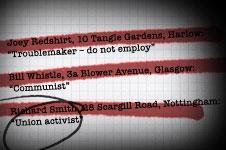Details emerge of contractors’ use of illegal blacklist up until 2009

Over 2,800 workers are still unaware they were blacklisted by contractors before watchdogs uncovered the practice in 2009, a report by the union GMB has said.
The Information Commissioner’s Office (ICO) – which uncovered the scandal – has only informed 224 of the 3,213 blacklisted workers that they were on the list since it was uncovered in 2009, the report says.
The news comes as construction worker Dave Smith appeared before the Scottish Affairs Select Committee at the House of Commons to discuss how his inclusion on the blacklist has affected his ability to find work in the sector.
Major firms including Balfour Beatty, Sir Robert McAlpine and Carillion were found to have paid for access to blacklists before 2009.
A raid on the offices of a firm known as the Consulting Association in Droitwich in 2009 revealed more than 40 firms were paying an annual fee to access information on workers’ union history, personal relationships and employment history.
The GMB report claims that Carillion obtained information on 224 blacklisted workers from the Consulting Association which they were considering employing.
The Consulting Association made a record of these requests and in 109 of the cases noted ‘given details and not employed’, the GMB report says.
The GMB says it has seen invoices that suggest Carillion made requests to check thousands of names against the blacklist and in one quarter alone spent £6,108 on searches.
A Carillion spokesperson said: “Carillion does not condone or engage in blacklisting. It is not against unions and recognises trade unions for some of its workforce nationally.
“These allegations of blacklisting are believed to concern matters that took place many years ago and relate to businesses acquired by Carillion. The law has changed significantly in the intervening period. Nonetheless, Carillion takes any allegation of this nature very seriously and is investigating.
“As these matters are also the subject of threatened legal proceedings it is not appropriate to comment in more detail at this stage except to confirm that Carillion will robustly defend any such proceedings”.
The Carillion disclosures have come to light as a result of an employment tribunal by Dave Smith against Carillion earlier this year, which resulted in a court order being made to the ICO to disclose information on Carillion’s use of the list.
Smith lost the tribunal on the grounds that he was a casual worker and did not have the same rights as a directly employed staff member.
A spokesperson for the ICO told Building its policy on the blacklist was to disclose information relating to an individual if that individual suspected he or she was on the list and then made a request to the ICO.
The spokesperson said: “It’s an offence for anyone at the ICO to disclose data without the consent of the individual concerned but we continue to allow anyone to make a subject access request if they suspect they are on the list.”
Downloads
GMB Blacklist report
PDF, Size 0 kb


























No comments yet